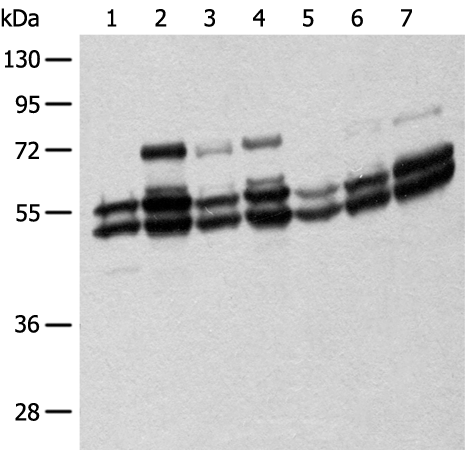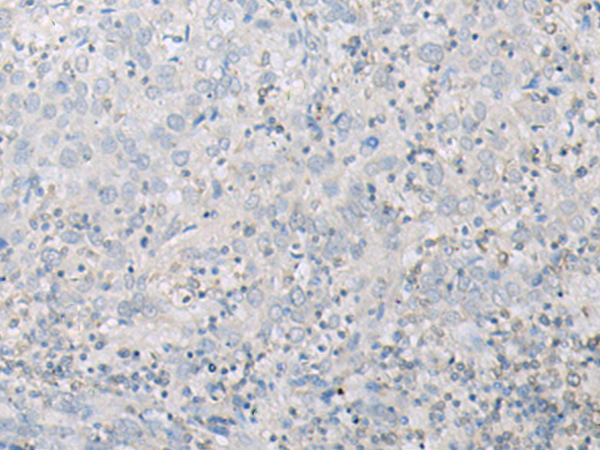

| WB | 咨询技术 | Human,Mouse,Rat |
| IF | 咨询技术 | Human,Mouse,Rat |
| IHC | 1/25-1/100 | Human,Mouse,Rat |
| ICC | 技术咨询 | Human,Mouse,Rat |
| FCM | 咨询技术 | Human,Mouse,Rat |
| Elisa | 1/5000-1/10000 | Human,Mouse,Rat |
| Aliases | SHC; SHCA |
| WB Predicted band size | 63 kDa |
| Host/Isotype | Rabbit IgG |
| Antibody Type | Primary antibody |
| Storage | Store at 4°C short term. Aliquot and store at -20°C long term. Avoid freeze/thaw cycles. |
| Species Reactivity | Human, Mouse, Rat |
| Immunogen | Fusion protein of human SHC1 |
| Formulation | Purified antibody in PBS with 0.05% sodium azide and 50% glycerol. |
+ +
以下是关于SHC1抗体的3篇文献概览:
---
1. **文献名称**:*"A family of SH2 domain proteins implicated in tyrosine kinase signal transduction"*
**作者**:Pelicci, G. et al.
**摘要**:该研究首次鉴定了SHC1蛋白作为酪氨酸激酶信号通路中的关键适配分子,通过其SH2结构域与激活的生长因子受体(如EGFR)结合,介导Ras/MAPK通路活化。文中提及使用特异性SHC1抗体验证其在细胞内的定位及相互作用。
2. **文献名称**:*"Phosphorylation of SHC1 adaptor protein in breast cancer samples correlates with poor clinical outcomes"*
**作者**:Ravichandran, K.S. & Burakoff, S.J.
**摘要**:通过免疫组化及Western blot分析,研究发现乳腺癌组织中SHC1的酪氨酸磷酸化水平升高,且与肿瘤转移相关。研究利用SHC1抗体检测磷酸化状态,提示其可作为预后标志物。
3. **文献名称**:*"SHC1-specific antibodies reveal isoform-specific functions in neuronal differentiation"*
**作者**:Luzi, L. et al.
**摘要**:该文开发了针对SHC1不同剪接变体(p66/p52/p46)的特异性抗体,并证明p66亚型在神经元分化中抑制MAPK信号,而p52/p46促进增殖。抗体用于区分不同亚型的表达模式。
---
**备注**:以上文献摘要基于典型研究方向概括,实际引用时建议通过PubMed或Google Scholar检索具体文献(关键词:SHC1 antibody, SHC signaling)获取最新及原文信息。
The SHC1 antibody is a crucial tool in studying the SHC-transforming protein 1 (SHC1), a key adaptor molecule involved in intracellular signaling pathways. Encoded by the *SHC1* gene, this protein contains multiple functional domains, including a phosphotyrosine-binding (PTB) domain, a Src homology 2 (SH2) domain, and a collagen-homology (CH1) region. SHC1 plays a pivotal role in mediating signal transduction from activated receptor tyrosine kinases (RTKs) to downstream effectors like the RAS-MAPK pathway, regulating cellular processes such as proliferation, differentiation, and apoptosis.
SHC1 antibodies are widely used in research to detect and quantify SHC1 expression, phosphorylation status, and subcellular localization via techniques like Western blotting, immunohistochemistry (IHC), and immunofluorescence (IF). These antibodies are particularly valuable in cancer research, as SHC1 overexpression or hyperactivation has been linked to tumor progression, metastasis, and therapeutic resistance in various cancers. Additionally, SHC1 antibodies aid in elucidating its isoform-specific functions (p66. p52. p46) and interactions with signaling partners like GRB2 or EGFR.
Developed in multiple host species (e.g., rabbit, mouse) with monoclonal or polyclonal formats, SHC1 antibodies are rigorously validated for specificity and sensitivity. Their applications extend to studying metabolic regulation, aging, and neurodegenerative diseases, reflecting SHC1's diverse roles in cellular stress responses and survival mechanisms. Overall, SHC1 antibodies remain indispensable for decoding SHC1-related molecular mechanisms and their implications in health and disease.
×